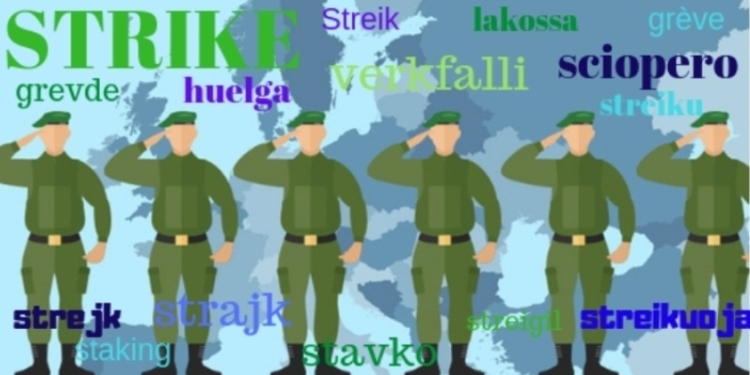The Right to Strike: The Cat is Out of the Bag!
Several months ago, I wrote the article “The Right to Strike: Like a Bull in a China Shop?”. With this article, linked to 35 country factsheets published by EPSU in collaboration with the ETUI on the right to strike in the public sector, I questioned the right to strike in the military. EUROMIL sees the right to form and join staff associations and trade unions linked to a regular social dialogue as its essential goal to achieve for military personnel in all European countries. And looking at the very specific nature of the military profession, we also accept that it is not always evident to implement the right to strike in the military.
In February 2019, I closed this article by saying that as long as we are not at the point of full representation for military personnel all over Europe, the right to strike will remain the bull in the (military) china shop. In other words, the debate on the implementation of the right to strike for military personnel lays in the hands of our governments and parliaments. It depends on them how they deal with trade unionism in the armed forces. When military personnel is granted full trade unions rights in their countries and as long as the employer (meaning the government) is taking these rights seriously (including establishing a social dialogue leading to binding agreements) the right to strike is not a real issue. However, when these fundamental rights are denied to military personnel or when granted but not taken seriously, the right to strike will always remain a part of the discussions.
The question however was how long it would still take before the right to strike really becomes an issue among military personnel and their trade unions? When EUROMIL lodged a complaint at the European Committee of Social Rights (ECSR) against Ireland for violating Articles 5 and 6 of the European Social Charter as regards the rights of Irish military personnel to organise and bargain collectively, the main focus of the complaint lay on the fact that our Irish colleagues could not form or join trade unions defending fully their rights as soldiers/workers. That also Article 6§4 of the European Social Charter has been raised, is because EUROMIL believes that the different paragraphs of Article 6 form a full package of rights. Anyway, in EUROMIL’s case against Ireland, the ECSR did not see a violation of Article 6§4 which concerns the right to strike.
However, the ECSR adapted its opinion when looking at the complaint of our colleagues of CGIL against Italy. In this case, the ECSR remains of the opinion that trade union rights should not be denied to military personnel and that, just like Ireland, also Italy violates Article 5 and a part of Article 6 of the Charter. The ECSR used strong arguments to motivate the decision on trade union rights in the military. Nevertheless, the ECSR decision on Article 6§4 concerning the right to strike, came out of the blue. For the ECSR the right to strike is intrinsically linked to the right to collective bargaining representing the most effective means to achieve a favourable result from a bargaining process. Therefore, the Committee is of the opinion that restrictions on this right can only be acceptable under specific conditions. Such restrictions may only be in conformity with the European Social Charter. The least that I can say, is that this is an unexpected outcome which will influence the future discussions on trade unionism but especially on the social dialogue in our armed forces.
And now? Soon the Committee of Ministers will discuss the decision and can adopt a resolution or a recommendation on the issue. However, what the Committee of Ministers cannot do is reverse the case as reported to them by the ECSR. Therefore, the Italian case is an important precedent for all European armed forces. Together with the Irish case it can be used in all these countries that anno 2019 still deny the fundamental right to form and join trade unions and give them the opportunity to participate in collective bargaining leading towards binding agreements. Based on the clear violation of Article 6§4 in the Italian case, the discussion may be opened on the right to strike in all European armed forces. As already stipulated, restrictions are possible, but it must be clear that an absolute ban is out of the question!
Should this be seen as a call on the military to go on strike all over Europe? Not at all, but it is a clear message towards our governments that real military trade unionism in the armed forces can no longer be denied and should be taken seriously.
Emmanuel Jacob, President

